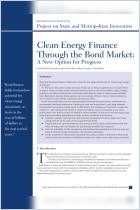Зарегистрируйтесь на getAbstract, чтобы получить доступ к этому краткому изложению.

Зарегистрируйтесь на getAbstract, чтобы получить доступ к этому краткому изложению.
Devashree Saha
Green Bonds Take Root in the U.S. Municipal Bond Market
Brookings Institution, 2016
Что внутри?
Municipal “green bonds” that fund infrastructure and energy projects are gaining investor attention.
Recommendation
In the United States, two overlapping concerns require massive spending: lowering carbon emissions and improving infrastructure in areas such as transportation, water and energy. The vibrant $3.7 trillion US municipal bond market has a major role to play in funding the projects that meet both priorities through “green bonds.” However, this article by policy expert Devashree Saha reveals that these instruments have some glitches. getAbstract recommends this enlightening report to government officials, investors and others interested in the progress and development of green municipal bonds.
Summary
About the Author
Devashree Saha is a senior policy associate with the Brookings Institution’s Metropolitan Policy Program. She researches clean energy’s role in economic development policy, as well as the transition to a clean energy economy.





















Comment on this summary